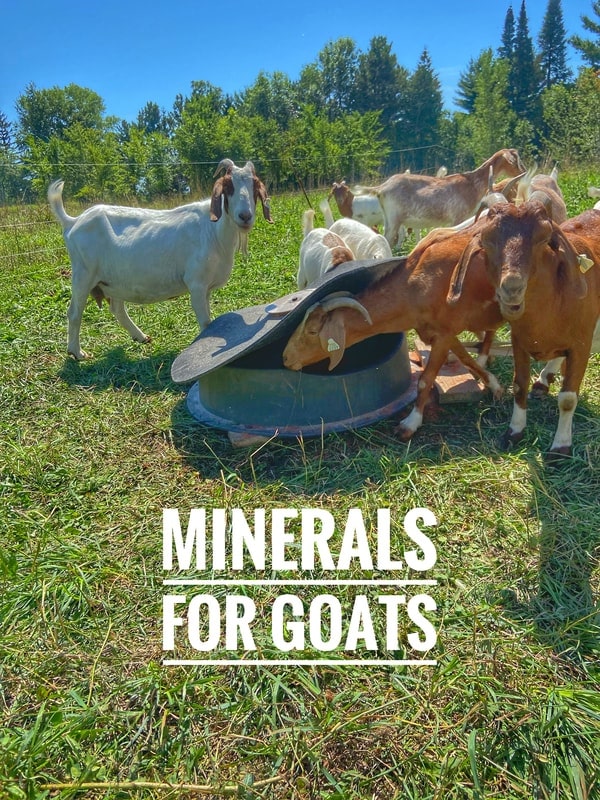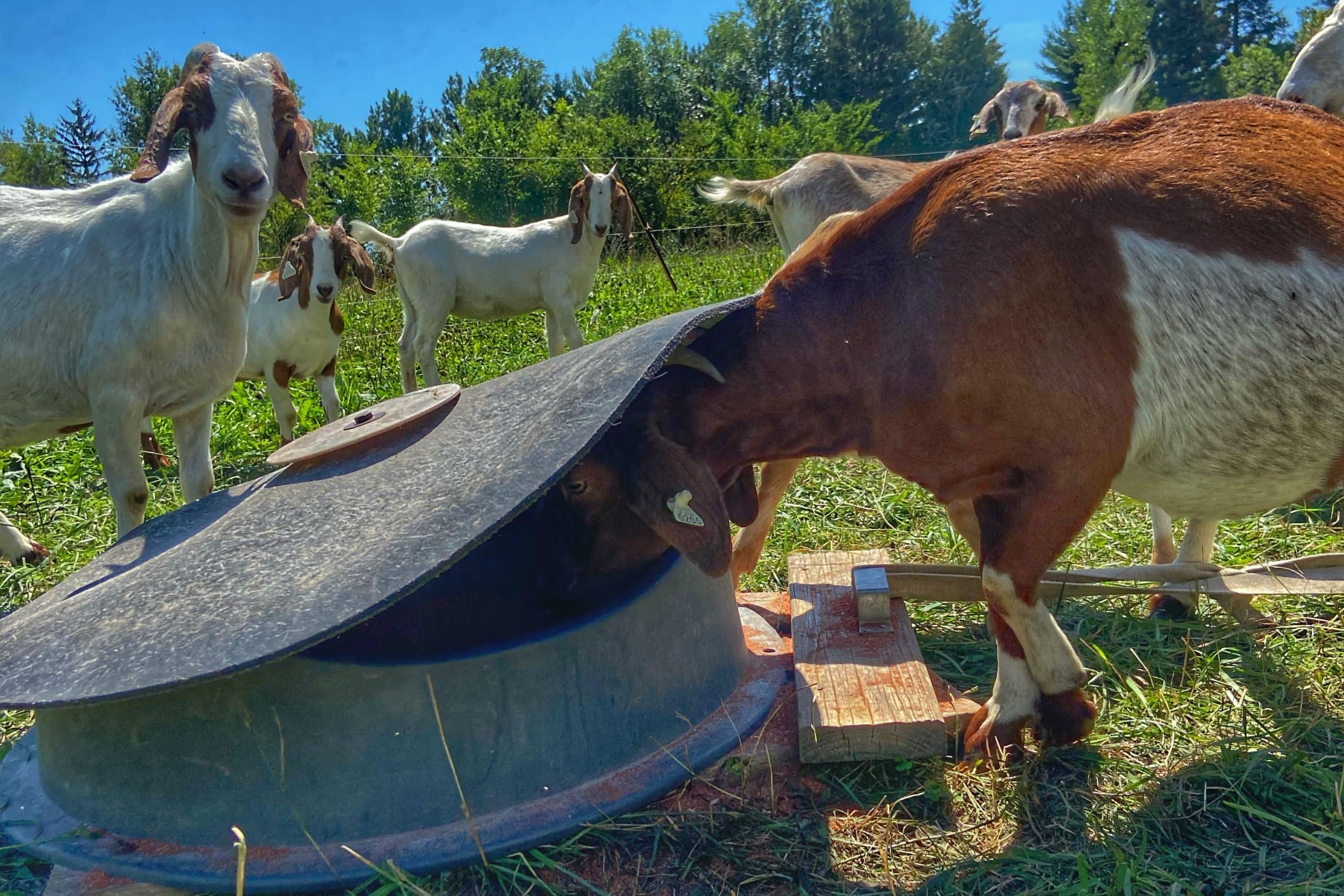Goats need a range of minerals to help their bodies function properly. While goats can get many of their needed minerals from their feed source, whether that’s fresh pasture, hay or grain, the amount of the minerals may vary. Deficiencies have the potential to cause health concerns, making it important to feed goats minerals.
What minerals do goats need?
Minerals are one of the six classes of nutrients needed to support life. They’re classified as macrominerals, which are a “larger” requirement of 0.1% or more of the diet, and microminerals, which are a “smaller” requirement at part per million (PPM). Micronutrients, also known as trace minerals, are needed in small amounts, 1 PPM is equivalent to 0.001g. Caution needs to be taken when feeding too much of a mineral as it can impact how other minerals are absorbed or even be toxic.
According to the Langston University, mineral requirements for goats are based on sheep and cattle requirements since there has been very little research done in the area of goat mineral needs.
Macrominerals
| Macrominerals | Associated with | Deficiency symptoms |
|---|---|---|
| Calcium (Ca) | bones and the skeletal system | Lameness, milk fever, urinary calculi |
| Phosphorus (P) | energy metabolism, component of enzymes and genetic material, acid-base balance | stunted growth, fertility issue, pica (low appetite and eating wood, rocks and bones), lack of energyp |
| Sodium (Na) | functions as an electrolyte | Drop in feed efficiency, stunted growth |
| Potassium (K) | functions as an electrolyte | Poor appetite, stiffness of body, pica, urinary calculi |
| Chloride (Cl) | functions as an electrolyte | Stunted growth |
| Sulfur (S) | Protein creation, enzymes, hormones, milk and hair production, hemoglobin, connective issues, part of biotin and thiamine | Poor performance, hair loss, weakness, tearing in eyes, excess salvia |
| Magnesium (Mg) | Nervous and muscular system functions, skeletal development, enzyme systems, metabolism of Ca and P | Low blood Mg levels, lack of appetite, convulsions, staggering |
Microminerals
| Macro or trace minerals | Associated with | Deficiency symptoms |
|---|---|---|
| Iron (Fe) | Hemoglobin, component of enzymes | Anemia |
| Copper (Cu) | Development of connective tissue, hair color, red blood cells, enzymes, and immune system function, nerve conduction | Lighter coloring of hair, rough coat, anemia, diarrhea, weight loss, and in young animals instability or paralysis |
| Cobalt (Co) | Vitamin B12 growth and production | Anemia, lack of appetite, drop in production, weak |
| Zinc (Zn) | Body tissue, skin growth, immune system | Low conception rate, low birth weight, deformity of front legs, hesitation of walking |
| Selenium (Se) | Antioxidant protecting cells, reproduction, and metabolism of cadmium, mercury, Cu, S, vitamin E | White muscle disease, kids having a difficulty nursing, slow growth, onset of paralysis, retained placenta |
| Molybdenum (Mo) | Oxygen transfer in some body enzymes | Rare |
| Iodine (I) | Thyroid hormones for reproduction and metabolizing energy | Goiter (enlarged thyroid gland in neck), pregnancy toxemia, reproduction issues, drop in growth, drop in milk production |
Minerals we use on our farm
Our goat herd always has access to a loose mineral mix, mineralized salt, and sodium bicarbonate. It’s available free choice in a mineral feeder with separate compartments.
Currently we use Purina Sheep Mineral since we keep our goats and sheep together. We do this to make sure the sheep aren’t getting to much copper in their diet since it can be toxic for their species. To make up for the lower copper levels, we give copper boluses two times a year. We’ve been doing this for a year and a half. We’re assessing if this dose of copper boluses are enough for the goats’ nutrient needs.
Prior to raising sheep on our farm, we used Purina’s Purina’s Wind and Rain Cattle Mineral, which is comparable to its goat mineral mix, but with more copper and an anti-caking agent. The anti-caking agent is important for us since our livestock are out on pasture most of the year. Even though the mineral is in a covered feeder, it can still get moisture from the elements. This helps prevent any mineral waste. We had used Purina’s Goat Mineral previously, which still is a quality mineral.
Here’s more about the other supplements we use with our goats:
Sodium Bicarbonate
This is the chemical term for baking soda. Think of it as tums for livestock. We have it in a section in our mineral feeder, so the goats and sheep can use it when they need it, depending on what they ate (or how much they ate) in the pasture. We purchase it from our local farm supply co-op, ALCIVIA, in 50 lb. bags, which is much more economical than buying boxes of baking soda from the grocery store or even in bulk at Costco.
Copper Bolus for Goats
It’s a slow release of dietary copper to help goats with overall health, fertility, and immunity. It also helps keep a healthy coat. Research also shows that copper boluses can also help with decreasing barber pole worm issues with goats. We use copper boluses for goats from Ultra Cruz Animal Health with a balling gun and a pill pusher for cats/dogs for younger animals.
Cobalt Bolus
Cobalt is a newer supplement we started using two years ago. It can be used with both goats and sheep to help prevent cobalt deficiency and help with coat growth and fertility. It also aids in the production of the B12 vitamin. We give it to our herd 1x over a three-year period and to goats over 50 lbs. We also order cobalt boluses from Ultra Cruz Animal Health.
Mineralized Salt
In the last year we started adding mineralized salt into our free choice minerals for our goats. Based on our the recommendation of our veterinarian we added additional salt along with our free choice minerals to address nutritional needs for some of the goats in our herd. More recently I started learning about mineralized salt, such as Sea-90, Redmonds or Kansas, and the health benefits these types of salt can offer livestock. To learn more about mineralized salt, listen to the Working Cows Podcast, episode 196 with Steve Campbell – Remineralizing Cattle with Salt.
Goat Mineral Feeder
Our favorite goat mineral feeders are a low, round, three compartment mineral feeder, covered with a rubber flap the goats can push up with their noses. Because we rationally graze, we have the mineral feeders on skids to easily move them to new paddocks. The rubber flap helps keep moisture out, while the low profile feeder is nice since it can’t be tipped over by the goats and even the younger animals can easily access the mineral.
The mineral feeders we are the 3 Block Bull Mineral Feeder from Behlen, which are typically found at many farm supply stores (we purchased ours from Farm and Fleet). A picture is below.
Minerals FAQ
Goats do better with a loose mineral mix instead of a mineral block since it is easier for them to lick. Goat tongues are softer than cattle, which tend to use mineral blocks more often. Loose minerals can easily be protected from the weather, such as rain and snow, with a covered mineral feeder. These feeders are heavy enough that goats aren’t able to flip them over and spill the mineral.
Yes, it is best to have free choice mineral available all the time. Goats will consume the mineral as they need it. Depending on the quality of their feed source, they may consume more of it. For example, we observe our goats eating more mineral when they are being feed hay (dried grass and forage) as compared to when they are grazing on pasture in the summer.
We often get questions about how we raise our sheep and goats together given concerns about the differences in copper requirements. Most sheep breeds can only have a small amount of copper in their mineral mix, while goats require a much higher level.
To easily manage our livestock, we keep our goats and sheep together. When it comes to minerals, we use a sheep mineral and then give our goats copper boluses so they are able get the copper they need.
Related resources
- Working Cows Podcast, Episode 196: Steve Campbell – Remineralizing with Salt
- Working Cows Podcast, Episode 261: Robert Cain and Michael Sileck – the Sea Salt Revolution
- Working Cows Podcast, Episode 244: Will Winter DVM – Natural Livestock Health
- ATTRA Voices from the Field Podcast, Episode 264: Holistic Animal Health with Dr. Ann Wells, DVM
Related posts

Originally published: August 24, 2021

LEAVE A COMMENT
Comments